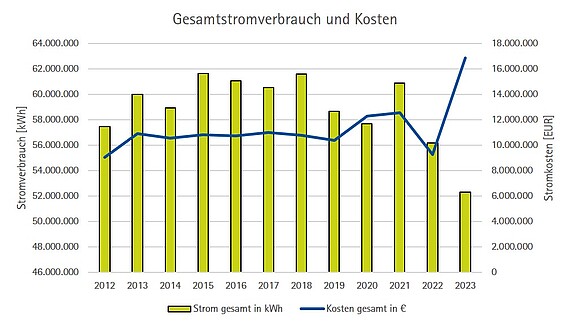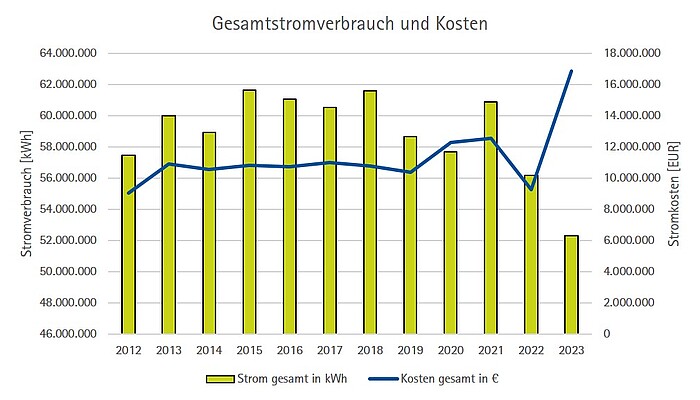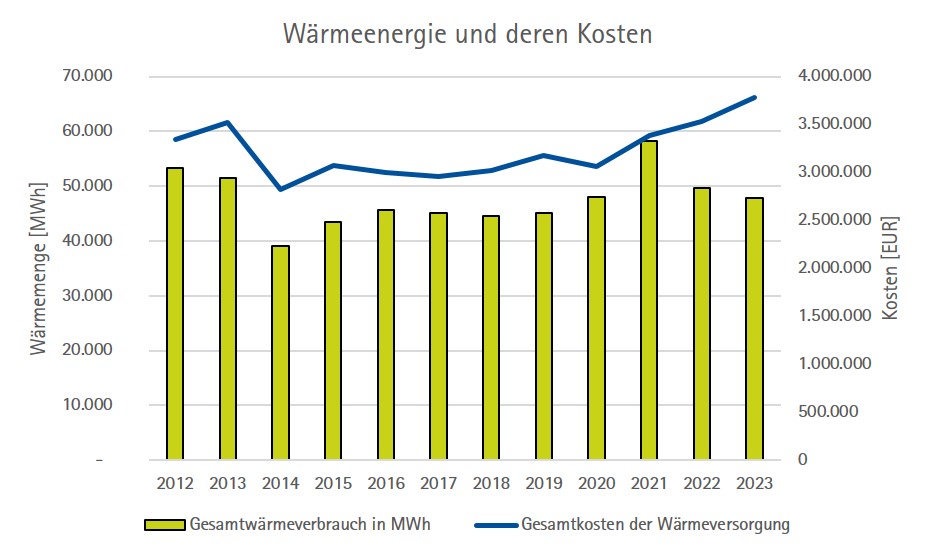Energy Management at Leibniz University
Leibniz Universität Hannover's energy management department advises the institutes and facilities management on energy supply issues. As part of this, potential energy savings are identified in day-to-day operations. The energy management division acts as a liaison between Department 3 "Buildings Management", the Green Office and the entire university organisation. Dedicated energy officers have been appointed at the individual faculties to facilitate the implementation of targeted measures. Thanks to this, jointly identified opportunities for introducing energy saving measures can be implemented in the best possible way, in close cooperation with the technology section of Department 3. We have decided to implement an energy management system in accordance with ISO50001 in order to efficiently map and track savings efforts and to meet the constantly growing legal requirements (including the EnEfG).
Total electricity consumtion and costs at Leibniz University Hannover



Since 2017, LUH has been procuring green electricity through the tendering process of the state of Lower Saxony and has thus significantly improved its carbon footprint.
After peaking in 2018, electricity consumption fell for two consecutive years. This was partly due to the removal of the high-performance computer in the data center and partly due to the effects of coronavirus and restricted university operations. Due to the return to on-site operations, a significant increase in electricity consumption was recorded again in 2021, although this has since been significantly reduced thanks to extensive energy-saving measures. Further efforts are underway to maintain this trend and thus counteract the constantly rising energy costs.
The energy consumption shown includes university-related third-party users (such as the student union, libraries and others).
TOTAL HEAT CONSUMPTION AND COSTS AT LEIBNIZ UNIVERSITY HANNOVER



LUH currently obtains district heating for almost all of its properties from the energy supplier enercity and is therefore dependent on the supplier's generation with regard to its carbon footprint.
Over time, it can be seen that heating energy consumption has remained at a constant level since 2018. This is a pleasing trend, as the area of LUH has increased by 7.5 % in the same period. The comprehensive efforts of building management to improve the building infrastructure are particularly evident here.
The heat consumption figures shown are not adjusted for weather conditions.
Activities
-
"Silent Night" at Leibniz University
Thousands of electronic devices are used every day at LUH. They are all necessary to maintain and further develop the ongoing operation of research-, teaching- and administration activities, but at the same time they cause very high energy consumption. One computer workstation, for instance, uses an average of 130 kilowatt hours of electricity per year.
With this in mind, the "Silent Night at LUH" project was introduced for the first time in 2018. As part of this project, the departments are called to switch off all unneeded devices at the workplace over the Christmas holidays, because operating printers, computers and computer monitors in stand-by mode still consumes significant amounts of electricity, especially when considering the large number of devices. Consciously ensuring that lights are switched off in buildings also makes a significant contribution to saving energy. In addition to this, a heating night mode has been introduced across all of the LUH’s buildings.
Over the past few years, the campaign has been implemented with great success. In 2018, some 400 staff members participated and about 14 percent of energy consumption was saved compared to the same period the previous year. In the successive years 2019 and 2020, the Energy and Environmental Protection Department called again to participate in the "Silent Night". Similar successes were achieved as a result of the initiative.
In 2021, "Silent Night" will again be held at LUH from 24.12.2021 to 02.01.2022. In this way, every single employee can make their contribution to saving energy over the holidays by taking small actions.
-
Refrigeration equipment replacement
At Leibniz Universität Hannover, a large number of cooling devices are used that consume electricity 24 hours a day. The vast majority of these devices falls under energy efficiency classes which are no longer up to date and thus consume a lot of electricity while also emitting unnecessary CO2. Not to be neglected is also the loss of cooling capacity that comes with older equipment.
The Green Office has therefore called for the replacement of cooling appliances in autumn 2022. The German Federal Ministry for Economic Affairs and Climate Protection is funding the project with € 22,098.00 via the municipal guideline of the National Climate Protection Initiative.
Project duration: 01.10.2023–30.09.2024
Registration: Registration for participation in the project is complete
Funding source: Federal Ministry of Economics and Climate Protection
Update: The application was approved by the funding organisation. All those involved have been informed by the Green Office about the positive funding decision and are now required to replace the cooling appliances applied for with more efficient new appliances.
Department 3 had already initiated the „Abwrackprämie für Kühlschränke“ in 2016 to stimulate the purchase of new energy-efficient refrigerators. The purchase of refrigerators with energy efficiency class A+++ was subsidised with €150 each. With the help of this premium, the replacement of a total of 54 old appliances in 2016 reduced the electricity consumption of the appliances by 17,762 kWh/a, saved operating costs of €3,120/a and reduced CO2 emissions by 6.52 t Co2/a.
-
Replacing lighting systems
Department 3 will gradually convert the lighting on the LUH campus to LED if measures pay for themselves within a corresponding period of time. The measures are prioritised for this purpose. Larger examples are presented here as examples:
Extensive lighting modernisation is taking place in parts of buildings 1101, 2505, 8903, 8102. In addition, the exterior lighting at the PZH and the Centre for University Sports will also be renewed. For this purpose, the existing lighting systems will be replaced with powerful and highly efficient LEDs. The first measures to implement the project will begin in 2023. For example, the lighting at the "Großer Wellenkanal", consisting of 48 luminaires of 80 W each, will be retrofitted with new luminaires of 50 W each. Through this measure, a reduction of 38 % in the annual electricity consumption of the lighting of this building can be achieved.
On the ground floor of the Conti Campus auditorium building, a total of 79 compact fluorescent 18 watt lamps were replaced with 21 new 43 watt LED panel lights. This reduced energy consumption by 2,934 kWh/a, cutting energy costs by €655/a and resulting in saving 1.08 t/a of CO2 emissions. Additional lighting on the remaining floors of the building is to be replaced as part of the ongoing project.
Information on funding projects from the pot for decentralised energy-saving measures can be found here.
-
Socket project "Sleep"
The idea for the "Sleep" power socket project was born in 2022 and was realised as part of David Schneider's bachelor's thesis. At the heart of the project are 160 IoT energy measuring devices that are plugged between the socket and the consumer and provide precise data on energy consumption. In contrast to conventional measurement methods, these devices enable detailed recording of the energy consumption of various consumers and thus provide a solid basis for the development of targeted energy-saving measures.
At the centre of the platform is an artificial thermal image (see illustration), which makes it possible to view the electricity consumption in the building at different times. At a glance, you can see when and where the cables are glowing and which sockets are constantly consuming electricity. David Schneider explains: "By continuously recording the energy data, we can directly evaluate the effectiveness of our measures and make adjustments if necessary." It was possible to develop a solution that is not only technically advanced, but also practical and compliant with data protection regulations. More information on the socket project can be found in the explanatory video (internal area).
The funding for this project was provided by the Green Office, while the final thesis was written at the Institute of Data Science under the supervision of Prof Dr Wolfgang Nejdl and supervised by Michael Senkler.
The platform is now available to all institutes and facilities at Leibniz University Hannover to analyse and optimise their own energy consumption patterns.
The precise energy demand can be visualised in various forms, including a map and a dashboard (see illustration). The link below will take you to a detailed explanatory video with English subtitles (LUH internal area).
-
Rental of electricity meters
The Green Office offers the temporary rental of electricity meters to all LUH employees. The devices can be positioned in the power outlet and thus record the power consumption of the connected electrical devices. In this way, an overview of the electricity consumption in the workplace or area can be obtained. The aim is to uncover hidden consumption and adjust user behavior accordingly. The electricity meters can be borrowed in sets of five for two weeks at a time. If you are interested, please contact the Green Office.
-
Switchable power strips
Switchable power strips can help save energy. Because they can switch off all connected loads simultaneously, switchable power strips avoid unnecessary stand-by operation.
Due to the great demand, the Green Office is now making a limited number of power strips available free of charge to interested employees, institutes and facilities at LUH. Only one power strip per person can be purchased for use in the office. A maximum of five power strips will be issued per institute or facility. Collective orders are possible. The promotion is only valid while stocks last. There is no entitlement to receive a power strip.
If you are interested, please contact us with the required information at greenoffice@uni-hannover.de.
For more information on saving energy, see the FAQ and the Green Office checklist.











